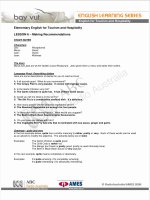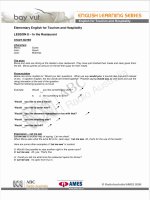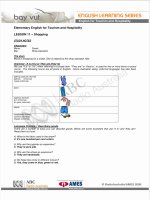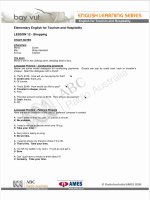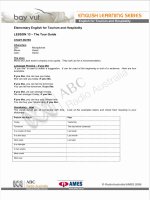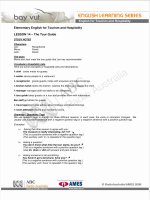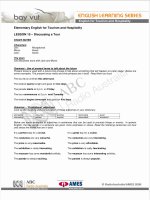English for tourism Studentss workbook
Bạn đang xem bản rút gọn của tài liệu. Xem và tải ngay bản đầy đủ của tài liệu tại đây (2.47 MB, 98 trang )
English for Tourism
Students’ Workbook
Ken McIntyre
Centre for Language Studies
Dili Institute of Technology
© 2013 Centre for Language Studies
Dili Institute of Technology
Dili, Timor Leste.
www.tetundit.tl
ISBN 978-989-8615-07-7
TABLE OF CONTENTS
1. AT THE AIRPORT ................................................................................................................... 1
1.1
Vocabulary: arriving and departing......................................................................................... 2
1.2
International signs ................................................................................................................... 3
1.3
Dialogue: At the airport (2.00pm) ........................................................................................... 4
1.4
Information on an airline ticket ............................................................................................... 5
1.5
Reading an advertisement ....................................................................................................... 6
1.6
Postcards from Singapore and Amsterdam ............................................................................. 7
1.7
Countries, nationalities and food ............................................................................................. 8
1.8
Exercise: WH questions .......................................................................................................... 9
1.9
‘Should’ / ‘shouldn’t’ .............................................................................................................. 9
1.10
A postcard from Amsterdam ................................................................................................. 11
2. TIMETABLES AND SCHEDULES ........................................................................................... 12
2.1
Time and time differences ..................................................................................................... 12
2.2
Vocabulary: Arrival and departure ........................................................................................ 13
2.3
Airline timetable.................................................................................................................... 14
2.4
Time prepositions .................................................................................................................. 16
2.5
‘Open’ and ‘closed’ ............................................................................................................... 16
2.6
Exercise: Verb tense .............................................................................................................. 20
3. AT THE HOTEL ..................................................................................................................... 21
3.1
Vocabulary: Hotels ................................................................................................................ 22
3.2
Countable and uncountable nouns......................................................................................... 23
3.3
Vocabulary: Accommodation I ............................................................................................. 24
3.4
Text: Maria’s holiday ............................................................................................................ 25
3.5
‘Some’ and ‘any’ ................................................................................................................... 26
3.6
Vocabulary: Accommodation II ............................................................................................ 26
3.7
Crossword: Capital cities ...................................................................................................... 27
3.8
Vocabulary: Tourism............................................................................................................. 28
3.9
Vocabulary: Hotel room ........................................................................................................ 28
3.10
Dialogue ................................................................................................................................ 29
3.11
Exercise: ‘WH’ questions...................................................................................................... 29
3.12
Vocabulary exercise .............................................................................................................. 30
3.13
Late for work ......................................................................................................................... 31
4. AT THE RESTAURANT .......................................................................................................... 32
4.1
Dialogue: The trainee chef .................................................................................................... 33
4.2
Vocabulary: in the restaurant ................................................................................................ 34
i
4.3
Text: Hong Kong .................................................................................................................. 35
4.4
Speaking practice.................................................................................................................. 36
4.5
Exercises: ‘WH’ questions ................................................................................................... 36
4.6
Compounds with ‘some’ and ‘any’ ...................................................................................... 37
4.7
Crossword: mixed ................................................................................................................. 38
4.8
‘both ... and’, ‘either ... or’, ‘neither ... nor’.......................................................................... 39
4.9
Text: In the restaurant ........................................................................................................... 40
5. TRAVEL DOCUMENTS ........................................................................................................41
5.1
Boarding pass ....................................................................................................................... 42
5.2
Filling in a form .................................................................................................................... 43
5.3
A departure card ................................................................................................................... 44
5.4
Text: Italy ............................................................................................................................. 47
5.5
Exercise: ‘any’, ‘some’, ‘much’, ‘many’ .............................................................................. 48
5.6
Crossword: Tourism ............................................................................................................. 49
5.7
Culture: Doing business in Timor Leste ............................................................................... 50
5.8
Exercise: Asking questions .................................................................................................. 51
6. CHARTS AND GRAPHS ......................................................................................................52
6.1
Maria’s guest house .............................................................................................................. 53
6.2
Exercise: conjunctions ‘and’, ‘or’, ‘but’ ............................................................................... 55
6.3
Hotel Guests ......................................................................................................................... 56
6.4
Prepositions for prices .......................................................................................................... 57
6.5
Crossword: Around the hotel ................................................................................................ 58
7. WRITING ..............................................................................................................................59
7.1
Rules of punctuation ............................................................................................................. 60
7.2
Formal and informal writing................................................................................................. 62
7.3
Writing a basic business letter .............................................................................................. 63
7.4
Writing a covering letter for a job application...................................................................... 64
7.5
Arranging a letter .................................................................................................................. 66
7.6
A job advertisement .............................................................................................................. 67
7.7
Conjunctions ......................................................................................................................... 68
7.8
Exercises: Comparatives....................................................................................................... 69
7.9
Writing emails ...................................................................................................................... 70
8. GRAMMAR .........................................................................................................................74
ii
8.1
Simple present tense ............................................................................................................. 74
8.2
Present continuous tense....................................................................................................... 75
8.3
Simple Past Tense................................................................................................................. 77
8.4
Present Perfect ...................................................................................................................... 78
8.5
Forming yes-no questions ..................................................................................................... 79
8.6
‘WH’ question words ............................................................................................................ 80
8.7
Forming ‘WH’ questions....................................................................................................... 81
8.8
Forming negatives ................................................................................................................. 81
8.9
List of irregular verbs ............................................................................................................ 83
8.10
Comparisons .......................................................................................................................... 85
8.11
Uncountable nouns, ‘many’, ‘much’ and ‘a lot of’ ............................................................... 86
8.12
Definite and indefinite articles .............................................................................................. 87
8.13
‘Some’ and ‘any’ ................................................................................................................... 88
8.14
Compounds with ‘some’ and ‘any’ ....................................................................................... 89
8.15
Prepositions with time ......................................................................................................... 89
8.16
Conjunctions: ‘and’, ‘or’, ‘but’ ............................................................................................. 90
8.17
‘Both ... and’, ‘either ... or’, ‘neither ... nor’.......................................................................... 91
8.18
Conjunctions: ‘because’, ‘so’, ‘therefore’; ‘although’/ ‘even though’ .................................. 91
8.19
Conjunctions of time ............................................................................................................. 92
iii
1. AT THE AIRPORT
I’m late.
This is where
passengers
collect their
baggage.
Here’s your
ticket sir.
Have a good
flight.
Thank
you.
Welcome to East
Timor
1
1.1 Vocabulary: arriving and departing
Insert the correct word from the box into the gaps.
customs officer
check in
collection
travel documents
1.
departure lounge
immigration officer
baggage allowance
immigration
carry-on bag
baggage
queue
visa
When you arrive in a country from overseas the .................................................... checks your
passport. In some countries you must have a .................................................... before you can
enter. Then you proceed to the .................................................... area to pick-up your bags and
then to the .................................................... who may, (but not always) check your baggage.
2.
When you leave a country you must first .................................................... with the airline to
get your boarding pass. If there are a lot of people you must ....................................................
Then you go through ...................................................., where they check your travel
documents and then to the .................................................... to wait for your flight.
3.
On most international flights you have a .................................................... of 20 kilograms per
person. Many airlines allow you to take one bag on to the aircraft usually a maximum weight
of 7 kg. This is called a ....................................................
Study the paragraph above and answer the following questions.
2
1.
What word means ‘abroad’?
______________________________________________
2.
What are ‘travel documents’?
______________________________________________
3.
What word means ‘go in’?
______________________________________________
4.
What are ‘international flights’? _______________________________________________
5.
Can you name some ‘airlines’?
6.
What word means ‘no more than’? ______________________________________________
7.
What is another word for ‘plane’? ______________________________________________
8.
What is another word for ‘depart’? ______________________________________________
9.
What words mean ‘for each’?
______________________________________________
________________________________________________
1.2 International signs
For each sign, write short answers to these questions:
1.
Where would you find these signs?
2.
What do these signs mean?
3.
Have you seen these signs around Dili?
1
2
_______________________
3
________________________ _______________________
4
5
________________________
6
_______________________
7
________________________
___________________________
8
______________________
Discuss: Are signs useful? Why? Why not?
3
1.3 Dialogue: At the airport (2.00pm)
Complete the dialogue by inserting the correct tense. Look for time phrases first.
Practice the dialogue with a friend.
Bill:
Hi, Ben where ................................... (go)?
Ben :
Hi Bill, I ................................... (fly) to China later this afternoon.
Bill:
................................... (go) for business or pleasure?
Ben :
Business, I ................................... (meet) some engineers tomorrow in Shanghai.
Bill:
How long ................................... (stay) there?
Ben :
I ................................... (stay) for three weeks and then I ................................... (fly) to
Korea. I ................................... (stay) in Korea until the end of the year and then
I ................................... (come) back.
Bill:
................................... (be) this your first overseas trip?
Ben :
No, I ................................... (go) to Indonesia last year and the year before that I
................................... (travel) to India.
Bill:
Anyway, why ................................... (be) you here?
Ben :
I ................................... (pick up) some visitors from America.
They ................................... (come) from Darwin but the plane ................................... (be)
30 minutes late so instead of arriving at 2 o’clock they ................................... (now, arrive) at
2.30pm. Americans ................................... (be) always late.
...................................They ................................... (be) never on time.
Bill:
I ................................... (hope) your listening skills are good because Americans
................................... (be) difficult to understand. They ................................... (have) a
strong accent and they ................................... (speak) very loudly.
Ben:
I ................................... (hope) they understand me. I ................................... (practice) my
pronunciation every night in front of the mirror.
Bill:
4
................................... (not, forget) ‘practice makes perfect’.
1.4 Information on an airline ticket
At the airport
Please make sure you are at the airport in time and remember to carry proof of identity and your
e-ticket with you as security may wish to see them.
Baggage
If travelling without bags then be at the gate 20 minutes before the flight departs. If you've got bag(s)
to check, be at a bag tag counter no later than 30 minutes before departure. The first two bags are free.
On board you're allowed one bag per person (maximum 7 kg).
Changes/restrictions
Changes permitted at any time. You may have to pay the difference between the original fare and the
new fare if higher. Service fee applies unless changed online.
Cancellation
Up to the day of departure, fully refundable. After the day of departure refunds will incur a refund fee
per person per one-way journey.
Exercise
From the information, what do you think the following expressions mean?
1.
proof of identity : .........................................................................................................................
2.
e-ticket
: .........................................................................................................................
3.
to check
: .........................................................................................................................
4.
tag
: .........................................................................................................................
5.
original
: .........................................................................................................................
6.
fee
: .........................................................................................................................
7.
online
: .........................................................................................................................
8.
fully refundable : .........................................................................................................................
Exercise
Read the information and answer these questions:
1.
Can a passenger change a ticket? .......................................................................................... .......
2.
How many bags can a passenger take on board? ..........................................................................
3.
If I change my ticket on the internet do I have to pay an extra charge? ........................................
5
1.5 Reading an advertisement
TIMOR LOROSA’E AIRLINE
Low cost flights to Asia from Dili.
Book in advance for even lower fares.
Discount for people under 25 years old.
BALI
from $70
(one way)
DARWIN
from $150 *
(return)
Book now by calling 73338459
Prices do not include airport taxes.
Maximum baggage allowance 25 kg.
Excess baggage charge $25 per kilo.
Tickets are non-refundable and non
transferable.
* Special conditions apply.
Find words and phrases from the advertisement which mean the same as:
6
1.
A single ticket
: ........................................................................................
2.
A ticket to go and come back
: ........................................................................................
3.
Less expensive fares
: ........................................................................................
4.
Extra luggage
: ........................................................................................
5.
Young people pay less
: ........................................................................................
6.
You cannot change your ticket
: ........................................................................................
7.
Reserve
: ........................................................................................
8.
A good price if you buy your ticket early: ............................................................................
1.6 Postcards from Singapore and Amsterdam
Exercise
Insert the correct tense of the verbs given.
Hi Maria,
I ......................... (write) this letter from Singapore airport. I ......................... (sit) in a small coffee
shop and I ......................... (wait) for my flight to Paris. My flight ......................... (depart) at
4.30pm and the trip ......................... (take) about 12 hours. I ......................... (not, look) forward to
the flight, it ......................... (be) too long.
I ......................... (go) to Paris last year and ......................... (stay) in a very small hotel in the
centre of town. It ......................... (be) very noisy and I ......................... (not, sleep) well.
It ....................................... (be) too cold. This time I ......................... (stay) in Paris for a few days
and then I ......................... (take) the train to Amsterdam.
See you later,
Your friend Mario.
Hi Maria,
I ......................... (arrive) in Amsterdam at 10.30am this morning. It ......................... (be) very cold
and it ......................... (snow). All the passengers on the train ......................... (speak) Dutch and
I ......................... (not, understand) a word. It ......................... (take) about three and a half hours
from Paris to here. I ......................... (buy) lunch on the train but it ......................... (not, be) very
good and it ......................... (be) expensive too. It ......................... (not, be) good value for money.
Now I ......................... (be) very tired. At the moment I ......................... (wait) for a taxi.
I ......................... (be) sorry about my writing but my hands ......................... (be) so cold.
I ......................... (wear) a woollen hat to keep my head and my ears
warm. I ......................... (look forward) to a good night’s sleep after all the travelling.
Best regards,
Mario
7
1.7 Countries, nationalities and food
When we talk about countries, nationalities and food, we must use the correct parts of speech.
The country name is a noun.
For the people, food, language and nationality, use the adjective form.
For example:
Australia/Australian
Thailand/Thai
Indonesia/Indonesian
Singapore/Singaporean
Korea/Korean
France/French
China/Chinese
India/Indian
Malaysia/Malaysian
Japan/Japanese
I come from Japan and I speak Japanese.
My sister lives in Australia and she has married an Australian.
Excuse me I am looking for a French restaurant.
In our hotel we have three Korean tourists and five tourists from Canada.
Exercise
Delete the incorrect word and write in the correct word.
1.
My brother has gone to study ......................... (Chinese/China)
in ......................... (Chinese/China).
2.
My motor cycle was made in ......................... (Japan/Japanese).
3.
The instructions have been written in ......................... (France/French).
4.
At our school we have three students from ......................... (Chinese/China) five from
......................... (English/England) and ten from ......................... (Australian/Australia). They
all like to eat ......................... (Japan/Japanese) food.
5.
Most of the visitors in our hotel come from ......................... (America/American).
6.
My favourite place to eat is the ......................... (Chinese/China) restaurant next to the
......................... (Chinese/China) Embassy.
7.
We have a new guest staying in the hotel. She is travelling on a
......................... (Europe/European) passport but she has a strong
......................... (American/America) accent.
8
1.8 Exercise: ‘WH’ questions
Read sections 8.6 and 8.7 about ‘WH’ questions. Then write questions to find the information
underlined. (Remember to check the verb tense.)
1.
They were picked up at 11 o’clock.
........................................................................................................................................................
2.
I take size 7 shoes.
........................................................................................................................................................
3.
We are flying with Merpati Airline.
........................................................................................................................................................
4.
Maria has gone to a meeting.
........................................................................................................................................................
5.
We are going to Baucau by bus.
........................................................................................................................................................
6.
The tour group arrived at 11 o’clock.
........................................................................................................................................................
7.
The taxi cost me ten dollars.
........................................................................................................................................................
8.
We are staying for a week.
........................................................................................................................................................
9.
You are working on reception tomorrow.
........................................................................................................................................................
10. Those three suitcases are mine.
........................................................................................................................................................
1.9
‘Should’ / ‘shouldn’t’
Should is a modal verb. It is used to give advice and to make recommendations. Should is not as
strong as must. Both should and must are always used before another verb; that other verb must be in
the infinitive.
You should speak to the manager.
You must speak to the manager.
You shouldn’t use your mobile phone when driving.
You mustn’t use your mobile phone when driving.
= It is a good idea (Diak liu...).
= There is no alternative (tenki).
= Polite advice (Diak liu la bele...).
= Prohibition (La bele).
9
Exercise
Complete the sentences with should or shouldn’t.
1.
It looks like rain. You ......................... take an umbrella.
2.
It is too far to walk. I think we ......................... take a taxi to the beach.
3.
We are lost. I think we ......................... ask someone for directions.
4.
Who ......................... we ask about the cost of a room?
5.
To find out whether there is a vacancy, you ......................... ask the hotel receptionist.
Exercise
Write five sentences giving advice to a tourist visiting Dili.
1.
You should ....................................................................................................................................
2.
You should ....................................................................................................................................
3.
You should ....................................................................................................................................
4.
You shouldn’t ...............................................................................................................................
5.
You shouldn’t ...............................................................................................................................
Exercise
Match sentences 1–5 with sentences a – e.
10
1.
What should I do when I start work?
a. We shouldn’t guess.
2.
You shouldn’t use a hammer.
b. You should sign in.
3.
We should read the instructions first.
c. You should use a screwdriver.
4.
You shouldn’t forget your helmet.
d. We should meet at the ANZ Bank.
5.
Where should I meet you?
e. You should protect yourself.
1.10 A postcard from Amsterdam
Exercise
In section 1.6, Mario wrote that he was going to Amsterdam. Here is his next postcard. He wrote it in
Amsterdam at 10.30am.
Fill in the blanks with the correct tense of the verb given. Remember to look at the time phrases.
Hi Maria,
This ......................... (be) my last postcard from Amsterdam. I ......................... (sleep) well last
night and I ......................... (get up) for an early breakfast this morning. I ......................... (receive)
your text thanks. I ......................... (be) here for nearly a week now. How time
........................ (fly)! It ......................... (be) a very busy city but the people ......................... (be)
friendly. The weather ......................... (also, be) a lot better over the past few days. Last night I
........................ (have) dinner in an exclusive restaurant and a fly ......................... (land) in my soup.
I ......................... (not, know) what to do. I ......................... (try) to explain to the waiter but he
......................... (not, understand) what I ......................... (say). Anyway, I ......................... (not,
finish) the soup. This afternoon I ......................... (go) to the famous Rijksmuseum. I
......................... (always, want) to go there.
My flight ......................... (leave) at 11.00pm tonight and so I ......................... (order) a taxi for
9.00pm. I ......................... (pack) my bags last night and I ......................... (find) a few extra dollars
so I ......................... (buy) a few more souvenirs.
See you later
Mario xxx.
11
2. TIMETABLES AND SCHEDULES
2.1 Time and time differences
There are two styles for stating the time:
The 12 hour clock. This is the most common time style for everyday use.
e.g. 8 o’clock, 8.30 am.
The 24 hour clock. This is most often used for timetables and schedules.
e.g. 20.00 hours, 08.30 hours
For times before 10 o’clock, add ‘oh’ before the number of hours. (In the army and police force,
people often say ‘zero’ instead.)
If there are minutes, then say the number of hours followed by the number of minutes.
When there are no minutes, then say the number + hundred hours.
12 HOUR TIME
7.30 am
10.00am
1.00pm
6.15pm
11.05pm
24 HOUR TIME
07.30 hours
10.00 hours
13.00 hours
18.15 hours
23.05 hours
24 HOUR TIME PRONUNCIATION
Oh seven thirty hours
Ten hundred hours
Thirteen hundred hours
Eighteen fifteen hours
Twenty three zero five hours
Exercise: 24 hour clock
Change these times to either 12 hour or 24 hour clock time.
12
1.
8.00am
= .........................
2.
9.45am
= .........................
3.
......................... = 02.00 hours
4.
......................... = 20.00 hours
5.
10.20pm
= .........................
Exercise: time differences
Fill in the blanks, and show the times on the clocks below.
1.
The time in Dili is 3.00pm.
2.
Singapore is one hour behind Timor, so in Singapore the time is ..........................
3.
New Zealand is four hours ahead/in front of Timor, so in New Zealand the time is
..........................
4.
Lisbon is seven hours behind Timor, so in Lisbon the time is ..........................
5.
What is the time difference between Lisbon and Singapore? .......................... hours.
Singapore
East Timor
New Zealand
Lisbon
2.2 Vocabulary: Arrival and departure
VERB
TETUN
NOUN
arrive
Too
arrival
depart
aranka, sai
departure
fly
Semo
flight
leave
sai, husik hela
land
(aviaun) tuun
13
2.3 Airline timetable
These are the timetables for Timor Air flights between Dili and Singapore, and Air North flights
between Dili and Darwin.
DEPART
SINGAPORE
ARRIVE
DILI
DEPART
DARWIN
05.45
15.30
09.15
05.45
09.45
05.45
ARRIVE
DILI
06.30
16.15
10.00
06.30
10.30
06.30
06.30
07.15
14.15
06.30
07.15
ARRIVE
SINGAPORE
DEPART
DILI
11.15
17.00
10.45
07.15
11.15
11.15
ARRIVE
DARWIN
13.00
18.45
12.30
09.00
13.00
13.00
08.00
09.45
08.00
09.45
Monday
Tuesday
9.25
14.15
9.25
14.15
Wednesday
Thursday
Friday
Saturday
9.25
Sunday
DEPART
DILI
Monday
Tuesday
15.25
18.10
15.25
18.10
Wednesday
Thursday
Friday
Saturday
15.25
18.10
Sunday
Exercise
Look at the airline timetable above. Fill in the times and the correct tense of the verbs.
1.
My sister ......................... (go) from Dili to Darwin next Wednesday. Her plane
......................... (leave) Dili at ......................... and ......................... (arrive) in Darwin at
......................... The flight ......................... (take) just ......................... hour and .........................
minutes. She ......................... (go) on a training course for five days and .........................
(return) to Dili the following Monday.
2.
Last Friday my boss ......................... (fly) to Singapore from Dili. The plane .........................
(depart) at ......................... and ......................... (land) in Singapore at ......................... The
flight ......................... (take) ......................... hour and ......................... minutes.
She ......................... (stay) in Singapore until next week because she ......................... (attend) a
conference there.
14
Exercise
Refer to the timetable above and answer these questions using complete sentences.
1.
On a Saturday what time does the plane from Dili arrive in Singapore?
........................................................................................................................................................
2.
What is the flying time between Darwin and Dili?
........................................................................................................................................................
3.
How many times a week is there a flight from Singapore to Dili?
........................................................................................................................................................
4.
Is there a flight from Dili to Singapore on a Tuesday?
........................................................................................................................................................
5.
What is the departure time of the flight to Singapore on a Wednesday?
........................................................................................................................................................
6.
What time does the flight from Darwin arrive in Dili?
........................................................................................................................................................
7.
Is there an afternoon flight from Dili to Darwin?
........................................................................................................................................................
8.
How many flights a week are there between from Dili to Darwin?
........................................................................................................................................................
15
2.4 Time prepositions
Read the information about time prepositions in section 8.15. Then insert the correct time prepositions
into the passage.
Dear Mr. Jones,
Thank you for your email. Our hotel opened ......................... April this year, so we have been open
......................... only 6 months and all our facilities are new. A new wing of the hotel opens
......................... May.
With regard to your reservation, I have changed your arrival date ......................... 14th October
......................... 18th October, and changed your departure date ......................... 17th October
......................... 22nd October, as you requested. We will pick you up at the airport
......................... 10 o’clock ......................... Monday 18th October as agreed.
The Tourism Conference runs ......................... three days. .........................Tuesday morning it starts
......................... 9.00 am, and there is a break for lunch ......................... midday. The conference
resumes ......................... 2 o’clock. ......................... 3 o’clock we have a special guest from the
Department of Tourism. .........................the evening there is a dinner for guests.
The conference will end ......................... 21st October ......................... around 3.00 pm.
I will arrange for a taxi to take you to the airport ......................... 8.00 am ......................... 22nd
October.
Regards,
Kenneth Johnson
2.5 ‘Open’ and ‘closed’
To say that something is open or closed, you can use either a verb or an adjective.
The verbs ‘open’ and ‘close’ refer to an activity.
The bank closes at 5.00pm.
subject
This box
is open.
verb
The adjectives ‘opened’ and ‘closed’ refer to a state. Like all adjectives, they must be used with the
verb to be.
16
Verb “to be”
The bank is open from 10.00am to 5.00pm.
subject
adjective
The shop closes at 5 o’clock.
The shop is closed from 5pm to 8am.
The supermarket opens at 8.00pm.
Some shops in America are open day and night.
Exercise
The Super Plaza: Opening hours
SHOPS
MONDAY TO FRIDAY
SATURDAY
Pharmacy
2nd floor
Bakery
Ground floor
Optician
3rd floor
Bookshop
Ground floor
Supermarket
Ground floor
Shoe shop
2nd floor
Tailor
3rd floor
8.30 to 5.30
9.00 to 12.30
SUNDAY & PUBLIC
HOLIDAYS
Closed
6.00 to 7.00
7.30 to 6.00
7.00am to 12.00pm
8.30 to 12.00
1.30 to 5.00
8.00 to 5.00
Closed
Closed
8.00 to 12.00
Closed
7.30 to 6.00
7.30 to 5.00
7.30 to 12.00
8.30 to 5.00
9.00 to 1.30
Closed
8.30 to 4.30
Closed
Closed
Exercise
Refer to the opening times above and answer the questions in full sentences. Then practice asking and
answering the questions with a friend.
1.
What time does the pharmacy open on Saturdays?
........................................................................................................................................................
2.
What time does the bookshop close on a Wednesday?
........................................................................................................................................................
3.
What time does the supermarket close during the week?
........................................................................................................................................................
4.
Is the tailor open at the weekend?
........................................................................................................................................................
17
5.
How many shops are closed at the weekend?
........................................................................................................................................................
6.
What time does the optician open after lunch?
........................................................................................................................................................
7.
Which shop opens first?
........................................................................................................................................................
8.
How long is the shoe shop open for on a Saturday?
........................................................................................................................................................
Exercise
Refer to the opening times above. Then read the dialogues, and fill in the missing information.
Practice these telephone conversations with a colleague.
Customer:
Good morning. Is that the pharmacy?
Pharmacy:
Yes, it is.
Customer:
Good. Can you please tell me your opening times?
Pharmacy:
Certainly...........................................................................................................................
Customer:
Good morning. Is that the bookshop?
Bookshop:
..........................................................................................................................................
Customer:
Good. Can you please tell me when you are open?
Bookshop:
..........................................................................................................................................
18
Exercise
SHOPS
MONDAY TO FRIDAY
SATURDAY
Optician
3rd floor
8.30 to 12.00
1.30 to 5.00
8.30-12.30
SUNDAY & PUBLIC
HOLIDAYS
Closed
Fill in the blanks with the correct information. Be sure to use the correct tense.
Then practice the dialogue with a colleague.
Maria calls the optician on Monday morning.
Maria:
Good morning ................................... (be) you open today?
Optician:
Yes we ................................... (be) open all day.
Maria:
................................... (phone) yesterday but there ................................... (be) no answer.
Optician:
Sorry, we ................................... (be, not) open on Sundays.
Maria:
I also ................................... (call) last Saturday.
Optician:
On Saturdays we ................................... (be) only open in the morning.
We ................................... (close) at ...................................
Maria:
Can I make an appointment to see the optician today?
Optician:
Certainly, what time ................................... (be) best for you?
Maria:
Well, because I ................................... (work) at the moment the best time for me
................................... (be) lunch time.
Optician:
I ................................... (be) sorry but we ................................... (be) closed at lunchtime.
We ................................... (close) at ................................... and open again at
...................................
Maria:
................................... (you, say) you ................................... (be) open on Saturday
mornings?
Optician:
Yes, we are open from ................................... to ...................................
Maria:
Very well, I will come on Saturday morning. Thank you.
19
